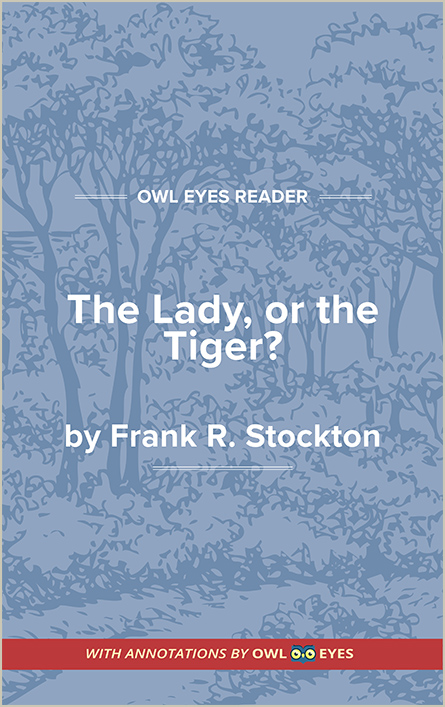Analysis Pages
Themes in The Lady, or the Tiger?
The Illusion of Unbiased Choice: The king has devised a system of justice that absolves him of all judicial responsibility. By allowing the prisoners to choose which door to enter, the burden of their fate belongs to them. In the king’s eyes, the prisoner chose to commit the crime, and therefore he should choose his consequence. For example, the young lover of the princess chose to fall in love with the king’s daughter. Now the young man must make a choice in the arena, the consequences of which will assuredly prevent him from being with the princess. However, because the young man is allowed to choose for himself, all others, the king and the audience included, are absolved of the burden of choice.
Love vs. Possession: Until the revelation of the affair, the princess and her lover seem to be happily in love. After discovering the truth, the princess is jealous of the other woman and her relationship with the young man. This ignites a fiery hatred of the woman. However, the young man remains steadfast in his love for the princess. Even on the day of his judgment at the arena, he loves and trusts her. He even goes so far as to follow her recommendation as to which door to open in the arena. The king also claims to have great love for his daughter and yet he throws the man she loves into an unwinnable arena. When supposedly acting out of love, these characters could in fact simply be acting out of a sense of possession. The blurred line between the two ideas is something that the characters continually straddle.
The Inherent Selfishness in Betrayal: Betrayal is a key factor driving many of the decisions made in the story. The king feels betrayed by the princess’s lover, so he puts him into the arena. This leads the princess to betray the king by discovering which door holds which fate. The princess is motivated by her belief that the lady has seduced the young man. If true, this affair represents a betrayal of their love. This leads to the final question of whether or not the princess betrays the young man in the arena—a question that remains unanswered. In every stage of the story, the betrayals—or perceived betrayals—are born from the desire to do what is in a character’s own self interest.
Themes Examples in The Lady, or the Tiger?:
The Lady, or the Tiger?
🔒"And so I leave it with all of you: Which came out of the opened door,—the lady, or the tiger?..." See in text (The Lady, or the Tiger?)
"Would it not be better for him to die at once, and go to wait for her in the blessed regions of semi-barbaric futurity?..." See in text (The Lady, or the Tiger?)
"it may have been on most unimportant topics, but how could she know that?..." See in text (The Lady, or the Tiger?)
"those fateful portals, so terrible in their similarity..." See in text (The Lady, or the Tiger?)
"fate..." See in text (The Lady, or the Tiger?)
"thinking part of the community could bring no charge of unfairness against this plan, for did not the accused person have the whole matter in his own hands?..." See in text (The Lady, or the Tiger?)
"arena..." See in text (The Lady, or the Tiger?)
"half of him which was barbaric..." See in text (The Lady, or the Tiger?)

